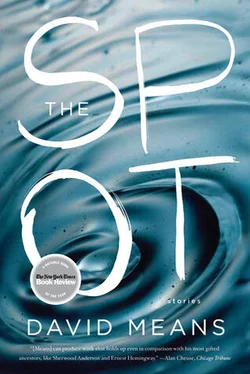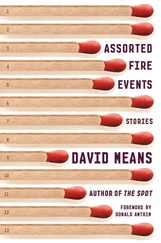Shooting out in the field in Nebraska, launching shots at a so-called range — really just a pile of old sandbags along one side of a trench — Byron extends his arms, holds his breath, and unleashes a shot that proves him to be the best marksman of them all (because in prep school — a military academy in Tennessee — shooting had been compulsory). When her turn comes she finds pleasure in the gun, solid and heavy with compressed energy as the hammer clicks into place; an enjoyable constriction (in the trigger spring, before the release) sends a bright charge up her arm, and then in answer the kick throws her back on her heels while the blue cloud hangs, reminding her of caps, of firecrackers. (She’ll enjoy this same smell later, sifting black powder from a rolled newspaper into galvanized pipes, tapping the wax into place before slipping the fuses through the softness.) Cans. Green glass insulators from old telegraph poles. Wine bottles. Pieces of fence post. She shoots them all and points the gun wildly into the sky and then down, waving the muzzle in Byron’s face and laughing until he slugs her hard and she falls back into darkness, only to wake in the trailer with a purple bruise on her brow and pain between her legs.
In the evening the men sit in front of the fire, talking softly, conspiratorially, their words quiet, epigrammatic. When they’re planning the heist — as they call it — Byron and August (nicknamed after the month he joined) speak in dainty voices, as if the scheme were an egg to be held with the utmost care. They sketch diagrams on paper — of the mall, the parking lot, the positioning of the truck, the various routes in and out, escape plans and alternates — and then burn the papers ritualistically, poking them into the flames with a stick.
Under the table an electric tingle spreads on her palms when she thinks about the guns and listens as the dogs stop barking, and there is only the rustling of trees, throwing mottled green shadows across the rooms upstairs. The oaks in front of the house have grown close to the screens, touching them, and with the breeze comes a smell from the Hudson that reminds her of summers at Lake George, when her father would come up from the city to visit for the weekends, relaxed, shedding his suit coat, his neck visible, loose-fleshed. Drinkable water, potable, her brother Hank liked to say, trying to get her to sip. You can see all the way to the bottom because it’s the purest lake water in the world. Now Hank’s in a grave, at Arlington, not far from the eternal flame over J.F.K. (I’m gonna blow it out, he had said, going up to pay his respects when they visited on a family trip.) Each summer, her father took them to the end of the lake to visit Fort Ticonderoga and told them how it had been conquered by a distant relative, Ethan Allen, and his Green Mountain Boys (the land of the dead, Hank had called it — hadn’t he?) — and then to a wooded area near the fort where the French had massacred the British, and then the British, a year later, massacred the French. The ghostly aftermath in the wind, the silent vestiges there amid the thin, second-growth forest of quaking aspen and ragged maple. The inaccurately reassembled buttresses. The placards that rang false against the weighty, blood-slicked solidity of history.
Monies to finance the bomb-making! Monies to demolish the status quo! To fight the system you gotta go within and undermine it, kick the scaffolding away. Whatever falls, falls. Those left standing are standing. There are incongruities to any movement, man, errors of judgment, hypocrisies all around, but that’s just the way it is, just the way things are , Byron says. The day is brilliant and clear with beautiful thick clouds drawing themselves lazily across the sky. Heading south from the hideout — following Route 9W, the old post road from Albany to New York, to avoid the cops who hang around tollbooths, moving through the old river towns, each presenting itself as brutal proof of the system’s failure, with boarded windows and dusty shop fronts and sad men smoking cheap cigars — she listens to Byron, a soft lisp rounding his words as he speaks of the downfall of the system, of tort law, of simultaneous orbital spin reversal, of the Rolling Stones at Altamont, of Lou Reed and the Velvet Underground, of his cohorts and colleagues, those who had failed him and those who hadn’t; of the need to locate plain speech, to find a new vernacular, to absolve the transgressions; he speaks in Latin, quoting Horace—“Nay, Xanthias, feel unashamed / That your love is but a servant / Remember, lovers far more famed / Were just as fervent”—while the river through the trees widens and then narrows as they coast the steep grade around Storm King Mountain. (During all of this, August remains silent with his big, meaty hands atop the wheel. He’s a quiet man. His words — when he does speak — seem to be pulled from a well by the bucket of his jaw.) Then they’re heading down the Palisades Parkway, past the state park, driving carefully, sticking to the speed limit, until they exit to the mall, where they look at their watches and assure themselves — in the bright late-morning light — that the plan is hitchless, locked into simplicity: exploit the open space between the store and the armored truck, the one soft vulnerability in the transportation of great funds. (She imagines the guards on a coffee break, sipping inside the cab of the truck, ignoring the money in the back, bored with the tedium of security work, not so much hoping for a robbery as fully aware that it might be the only way out of the monotonously long days of picking up loot. Perhaps there is some pleasure in staring out the bulletproof glass, far above the fray, and at times peeking through the thick aperture of the arm ports at what seems to be the far-off light of day.) To rob someone takes a sense that certain borders can be violated, she thinks. In the crux of the act, of course, lies violence. One way or another, the space will be, when they get there, neatly clear of other vehicles. (It’s gotta be pure karma, man, Byron had explained. All of the elements have to be aligned. It’s as simple as that.) At that moment, a deep, robust smell will emerge from the willow trees that hang delicately over the chain-link fence at the back of the mall. Long, narrow leaves sweeping slightly in the breeze. Byron will point a gun. August will, too.
The two men hauling sacks look up from behind their sunglasses; one of them has his pistol stuck between his big swing of belly and his belt. The other guy is lean, thin, boyish, nervous-looking, with his hand resting loosely on his gun, as if about to draw, when August says, Stop. Stop.
They agreed, when they were driving east from Nebraska, that the best way to control someone was with one-word commands, the way you’d train a dog, not by shouting but rather by speaking softly, with complete authority.
The thin one pauses, his lips parted slightly in a half smile, as if to say: This is the part of the job we expected. It was an eventuality, resting in the tedium of pickups, banks, Laundromats, furniture warehouses. The tedium of take-out coffee, of casual banter, of heavy traffic — gone. At some point along the line, I was going to come face-to-face with you. Then he lets his hand tighten down on his gun, taking one step forward, which causes August to say stop again. From the car, it all seems remote, as if on a stage. All four actors are forming a rhombus of tension points, a little toe dance from side to side. Then for a minute or so they rest in a frozen stasis. The fat one — from her view — seems wobbly, lifting his arms to reveal long dark stains below his armpits. Stop, Byron says. Step back to the wall. Step back and don’t make a move. Then August gives the signal, fluttering his hand behind his back, fluttering some more because:
Читать дальше












